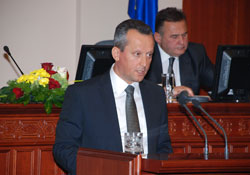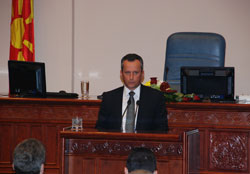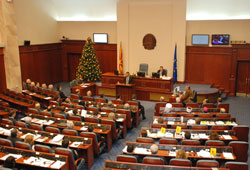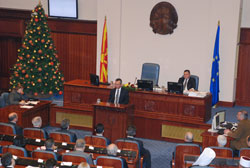Monday, 10 january 2011
Address of the President Veljanoski on the occasion of the 20th anniversary from the first constitutive session of the Assembly of the Republic of Macedonia
 Ladies and Gentlemen,
Ladies and Gentlemen,
Distinguished Guests,
Dear Colleagues Members of Parliament,
20 years ago, the first multiparty parliamentary composition of the Assembly of the Republic of Macedonia was constituted in this Hall.
20 years have passed since the Republic of Macedonia became an independent and democratic state.
Two decades have passed since the first Session of the first legitimately elected representatives of the people in the first multiparty legislative house in our country.
Since than, despite all the turbulences, the MPs of the Republic of Macedonia have climbed the highest peaks which contributed to the defining of our statehood.
There were difficult moments.
The centuries old dream of the generations of citizens of the Republic of Macedonia needed to be put into practice in this very Hall.
We have surpassed the difficulties, we have conquered the peaks, and we have stood against the tides.
The independent, sovereign and autonomous Republic of Macedonia was established.
It was a reflection of the legitimate needs of the Macedonian nation and all its citizens.
Independent Macedonia was the project which incorporated the idea of Ilinden for democracy, coexistence, competitiveness and development.
The progressive democratic ideas of the revolutionaries, contained in the Manifest of the Krushevo Republic, were valorized in the modern Macedonia. The vows of the Krushevo Republic for tolerance and understanding among all and for all have confirmed their timelessness and rightfulness with the establishing of the Assembly of the Republic of Macedonia.
Finally, the sacrifice of the Ilinden revolutionaries and of the first democratic Government which grew up from the battle in the legendary Krushevo was reborn in this Assembly.
The famous epopee, whose culmination was ASNOM, is implemented in the foundation of the Macedonian legislative house.
The sacrifice of the partisans and the glory of the Second Ilinden from 1944 is the energy which contributed for the establishment of the Macedonian model of parliamentary democracy.
The decisions adopted by the Anti-Fascist Assembly are the basis of our parliamentary system.
Dear friends,
The Macedonian state which developed from the whirlwind of the Second World War is also a result of the victory of the Macedonian Army over the Fascist invaders, which because of the historic circumstances at the time, as well as because of the relations among the great forces, remained in the framework of the Yugoslav Federation.
Nevertheless, in the postwar period, although within the Yugoslav Federation, all the social and state systems and institutions which characterize the states were established in the Republic of Macedonia. Beginning with the education system in the mother tongue from primary to university level of education, the promotion of the Macedonian culture and the establishment of the cultural institutions, the health-care system, the financial institutions, the national Media were established, the agriculture and the industry were developed, and so on.
 Nevertheless, the Federation imposed a system of ideology which was founded on the truth of a single party, where the citizen is a member of the collective which was to be established, a system in which human rights and freedoms, from political activity to private property, were completely abolished and denied. In this type of system, instead the rule of law the ideology of totalitarianism prevailed, which in a way meant abandonment of the ideas of freedom of the Macedonian partisans.
Nevertheless, the Federation imposed a system of ideology which was founded on the truth of a single party, where the citizen is a member of the collective which was to be established, a system in which human rights and freedoms, from political activity to private property, were completely abolished and denied. In this type of system, instead the rule of law the ideology of totalitarianism prevailed, which in a way meant abandonment of the ideas of freedom of the Macedonian partisans.
I would like to remind you that the first President of the Presidium of ASNOM, Metodija Andonov-Chento, was sentences to long imprisonment only because he stood for a different political system and greater independence for the Republic of Macedonia. Unfortunately, these sufferings were not limited to the people like him; they were felt by their families and their closest relatives many years after this period.
Unfortunately, this political system and governance also had its consequences on the foreign affairs. The Republic of Macedonia, and the whole Yugoslav Federation, remained behind the iron curtain which symbolically divided Europe on free and democratic states on one side and single party, non-democratic and non-free states on the other side, Thus, the Republic of Macedonia and the Macedonian citizens were denied a natural communication with Europe, with the values of the fathers of United Europe where, I am convinced, the Republic of Macedonia will have its place.
This is our next great battle.
That is the testament for the years to come.
Europe and NATO are the goals which have the weight as the creation of the foundations for free development of the Republic of Macedonia.
Better life for our citizens and further strengthening of the democracy are the result which we will achieve with membership in these structures. In this regard, I would like to remind you that 11 centuries ago, in the time of the Ss. Cyril and Methodius and their students St. Clement and St. Naum, Macedonia was not a province of Europe. On the contrary, this is the place from where these holy people started to spread their education and spiritual mission. That is why we rightfully say that the Republic of Macedonia, that gave so much to Europe, deserves to be part of the European Union.
Distinguished colleagues,
We cannot live in history, but we can learn from history.
The MPs from the first multiparty Assembly constituted 20 years ago have finalized the idea for the creation of a sovereign and independent state.
The first parliamentary composition had nine political parties and three independent MPs.
Those were times of turbulence and war in the region of former Yugoslavia. In such circumstances, on 25 January 1991 the Assembly adopted the Declaration of Sovereignty. The Declaration clearly defined and proclaimed the changes in the social, economic and political system, and it was announced that the issue of sovereignty will be defined in the new Constitution of the country. On 6 August of that year the Assembly adopted the decision for Referendum on Independence, which was carried out on 8 September, when the great majority of the citizens voted for independent and sovereign Republic of Macedonia. On the basis of the decision from the Referendum, on 17 November the Assembly of the Republic of Macedonia adopted the most important state and legal act - the Constitution of the Republic of Macedonia. It defined our state as an independent state, whose sovereignty is derived from and belongs to the citizens. The new state is also a democratic and social state. It is founded on the principles of parliamentary democracy, division and independence of the three branches of power, the rule of law, market economy and inviolable private property. The Constitution clearly defines the human freedoms and rights, proved by the fact that 2/3 of the text of the Constitution refer to these rights.
On 19 December 1991 the Macedonian legislative house adopted the Declaration with which the Republic of Macedonia requested international recognition on the basis of the Declaration for Dissolution of Former Yugoslavia. At the beginning of 1992 the law on the Army was adopted, followed by the law on the national currency – the Denar, etc.
The state was finally constituted with all its attributes and features.
The state started its long path to eternity.
The citizens finally started to fully enjoy freedom.
The Republic of Macedonia became an independent state!
 Ladies and gentlemen,
Ladies and gentlemen,
All of the above-mentioned, without any false modesty, strongly demonstrates that the MPs from the first parliamentary composition have, with their courage sense for the significance of the historic moment, courageously finalized the centuries old idea and determination for creation of a sovereign and democratic Macedonia,.
Therefore, on my personal behalf and on behalf of the MPs from the current composition, I feel a profound need to express great appreciation for their role. I am convinced that their work - together with the work of the Ilinden revolutionaries the Members of the first Session of ASNOM, as well as the work and actions of the other fighters for freedom - will remain engraved in the memory of the generations to come. At the same time, this is an obligation for us and for the public officials, to cherish what has been created, but also to do their best to promote it, guided only by the eternal idea - independent and developed the Republic of Macedonia.
Distinguished colleagues,
In the past 20 years the sovereignty and independence have been further developed. The fact that in the past two decades the six parliamentary compositions have adopted over 3000 laws shows that the legal system of the Republic of Macedonia has been completed. Also, hundreds of international bilateral agreements and other international documents have been ratified. Furthermore, the Ohrid Framework Agreement, on the basis of which the Constitutional Amendments have been made, further promoted the position of the ethnic communities.
The Republic of Macedonia is a unitary state of the Macedonian nation, and at the same time it is the homeland of all its citizens. As a multicultural and muticonfessional society we are creating the conditions where all the citizens, whether Macedonian, Albanian, Roma, Serb, Vlach, Bosnian or member of some other ethnicity, feels that the Republic of Macedonia is their homeland in which on one hand they will enjoy all the human rights and freedoms, preserving, developing and expressing their ethic, cultural or linguistic identity. We are guided by the Constitution and the European standards and documents, but primarily by our human nature, to live in tolerance, understanding and coexistence. At the same time, the European standards, the Constitution and the laws, oblige us additionally, as individuals or members of a particular ethnic community, to be loyal citizens.
In the first 20 years of our independence we are continually determined to become full members of the European Union and NATO. We have full political consensus on this, together with the high degree of support of our citizens.
Unfortunately, in these 20 years the only obstacle in the accomplishment of our commitment for membership in the EU and NATO is the absurd dispute imposed by our Southern neighbor, regarding our constitutional name.
In this context, allow me to remind you how in July 1992 the parliamentarians from the first parliamentary composition with full conviction and principle voting of the Declaration rejecting the Conclusions of the Lisbon Summit of the EU Member States, which demanded elimination of the word Macedonia from the name of our country. The citizens of the Republic of Macedonia have survived various ordeals, occupations and most unjust attempts for denunciation of their own national and cultural identity. This particular historic experience gives me the right to believe that this time, the negotiations process led under the auspices of the United Nations will result in a lasting solution which will not interfere with the national, cultural and linguistic identity of the Macedonian nation.
At the same time, we are aware that the membership in the European Union imposes a lot of work and profound reforms in all areas of the social life in general.
I would like to remind you that the Republic of Macedonia was the first country from the Region which ratified the Stabilization and Association Agreement with the European Union. I would also like to remind that after the submission of the answers to the questionnaire, the Republic of Macedonia gained the candidate status for Membership in the Union. I believe that I should not remind that we have received the recommendation for opening the accession negotiates from the European Commission in the past two years. All this demonstrates that we are working hard on the fulfillment of the obligations, and at the forefront of all these reforms is the Assembly. At the same time I would like to emphasize two facts: all these reforms and the implementation of the European standards are being made because they ensure better life for the citizens, not because Brussels demands from us to make these reforms. Secondly, could we or can we be more dynamic in the carrying out of all these reforms. The answer is undoubtedly yes. I know that we can always be more and do it better.
 Ladies and Gentlemen,
Ladies and Gentlemen,
In the past 20 years of parliamentary democracy we now have the 6th parliamentary composition. In these 20 years of parliamentary life, every composition gave its significant contribution. Today, we have finalized the legal system, in normative sense, and the legal state is based on this legal system. In the past period we have also developed intensive international activity. In this sense, the Assembly has established bilateral relations with the parliaments from Europe and beyond. At the same time, I would like to underline the cooperation with the parliaments from the region which significantly contributed for the stability in this part of the world and its Euro-Atlantic future.
Today, the whole legislative process in the Assembly is being performed electronically, which means that we have introduced the so-called E-Parliament System, which puts us in the top half of the European states which work in this way. With the introduction of this concept of work we made a qualitative step forward in the direction of further increase of transparency. This parliamentary composition has adopted the new Rules of Procedure and the Law on the Assembly. Recently, we adopted the amendments to the Rules of Procedure which strengthen the role of the opposition. The regular coordination meetings with the Coordinators of the political parties, which are also attended by the Vice Presidents and a Government Representative on the level of Deputy Prime Minister, is one of the many mechanisms for practicing and developing democracy and the political dialogue. Through the prism of my experience, I can conclude with pleasure that I am encouraged by the fact that we are more aware that both the government and the opposition need dialogue.
Distinguished gusts,
With this brief summery of our first 20 years I wanted to remind you of the evolution of parliamentary democracy, and of the introduction of the standards which characterize a modern legislative house, such as the Macedonian. Out colleagues the MPs from the first parliamentary composition were focused on the foundations of the independent Republic of Macedonia and its international recognition. They have done with great success. Our goal is to continue to build the legislative house as a true temple of democracy which will be prepared to respond to all the tasks and commitments I spoke about.
In the year which has just started we are faced with serious challenges. I sincerely believe that every MP from today’s composition has the strength and will to rise to the challenges facing the Republic of Macedonia in order to build a better today and more prosperous future.
Allow me in the end, on behalf of all of us and on behalf of the citizens of the Republic of Macedonia, to express gratitude to the colleagues from the first parliamentary composition who, together with other state institutions, have fulfilled the dreams, the efforts and the determination of many generations and established the Republic of Macedonia as an independent and sovereign country.
Today, the Republic of Macedonia is a reality!
The Republic of Macedonia marches forward keeping its head up high!
Our homeland became independent and is ready for the eternity!
Long live the Republic of Macedonia!
Thank you.